Nate Parker: Using Art to Tell Stories that Heal
This is the second segment of our two part interview (catch part one here) with Activist/Actor/Director Nate Parker. Parker stars as Officer Kaz Nicols in his latest successful film Beyond the Lights. He just released #AmeriCAN, a powerful PSA inspired by the death of Mike Brown and the events in Ferguson, MO, and is currently working on his Nat Turner biopic, Birth of a Nation. We were excited that the actor who some are saying should be Hollywood’s next leading man, was able to provide Afro State of Mind with an in depth interview. If you missed part one, you can read it here.
********
ASOM: So your latest project is The Birth of a Nation, the Nat Turner Biopic. Most people don’t know the details behind Nat Turner’s story. Those who do are often afraid of what he stood for and what he represents. How are you able to reconcile that and what made you decide to take this story on?
NP: There are a couple of reasons. I was changed after The Great Debaters and wanted to do more movies like that. I also really love the movie Braveheart and always wanted to play that type of role, the William Wallace character played by Mel Gibson. The more I researched Nat Turner the more I realized he was like our version of Braveheart.
It was natural to combine those two things and turn this into a project.
I grew up a few miles away from where the Turner rebellion happened. So I grew up hearing echoes of his voice as a young man. I didn’t have proper context but I knew he existed. And I knew there were “whispers” that he was powerful. The more I studied and learned about him the more it blew my mind.
ASOM: We’re not usually taught the version of slavery that includes people like Nat Turner. We’re certainly not taught the version of slavery that discusses the role of resistance, either passive or active.
NP: I almost didn’t believe it at first. We usually hear that Black people were slaves in a way that makes it seem like they just took it, like they just accepted it. The way the story is told it is as if they just laid there until someone told them to get up.
ASOM: True. One of my favorite quotes is that we are all historical products so who we are today is in part the result of the choices made in the past. When we only learn a version of slavery that excludes resistance it impacts our perception of ourselves in the past and our present day capacity. But the story of William Wallace in Braveheart is all about resistance to injustice.
NP: The story of Braveheart, man, that movie really did something for the cultural pride for a lot of people with roots in Scotland. It was so inspirational to so many. So I realized that if more of my community knew what I was learning about Nat Turner, that could help shape and positively impact our sense of cultural pride.
ASOM: So using art and history to tell a story in a way that is healing?
NP: Exactly. I’ve been researching this story nearly eight years so I’m excited about it. Nat Turner is such a complex character because he was also a preacher. So everything he did was related to how he saw the Bible and God’s desire for him and his people to be free.
ASOM: Now that’s an interesting angle. In the Christian context, people don’t often connect the idea of “freedom from slavery” with the notion that fighting for that freedom can be an expression of service to God.
NP: One thing we learned as we researched for this film was that there was a difference between pro-slavery Christianity and liberation Christianity. Nat Turner understood that difference. If Turner was just an angry, crazy person I would not be interested in telling his story, because raw anger is not interesting. In acting we say anger is one of the least interesting emotions. Audiences aren’t moved by anger; they are moved when people’s hearts are moved. When a character makes certain choices because they don’t see any other options.
#AmeriCAN: a Public Service Announcement
ASOM: So often we forget or don’t get an opportunity to celebrate the stories of the people who resisted. I’m looking forward to seeing what you do with that film. Especially since I was blown away by your PSA/short film #AmeriCAN. I assume that was inspired by the events in Ferguson, MO and the murder of Mike Brown?
NP: Yes. After I heard about Mike Brown’s murder I went home and turned on the television. I called my nephew out to watch with me. We watched news coverage for hours and we watch that young man’s body lay there in the street before he was tossed into the truck. And my nephew asked looked at me and he asked me, uncle Nate what do I do if I get pulled over on my bike?
And I open my mouth because I thought I had a quick answer. But then I realized that I didn’t have an answer at all. I’ve had custody of him for the past few years and despite the great education he is receiving now, despite the preparation he’s getting now to be a man and an activist, as a Black man, my nephew was no safer with all of those supports in place than he was when he lived in the neighborhood I took him from.
So I told him I didn’t know but that I was going to find out. I decided in that moment to go to Ferguson. I didn’t know what I would find there, but I realized that Mike Brown is not just one Black youth. Mike Brow is representative of Black people everywhere whether they live in Ferguson, MO or if they live in Skip Gates’ neighborhood. Mike Brown is every Black person who “fits the description.” So I bought my ticket, we got a cameraman and a few of us headed down there.
ASOM: When you arrived how did you get plugged in?
NP: We met up with some young folks from Ferguson who began filling us in on what was happening locally from their perspective. The more folks we spoke with the more we heard about the long-standing issues and abuses the community had suffered that went beyond Mike Brown.
It was interesting because before I arrived I had a conversation with a friend about the privilege of apathy. We were talking about the fact that though some of our non-Black friends were bothered generally by the injustice of his death, it did not impact them personally. We wanted to create something in the spirit of Mike Brown that people could relate to on a personal level. We wanted to inspire a sense of empathy without allowing the luxury of tapping into that sense of detachment.
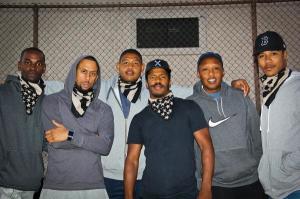
On set of #AmeriCAN. Left to Right: Mo McRae, Affion Crockett, Omar Benson Miller, Director Nate Parker, Terry Miller (brother of Omar Benson Miller) and Brian White. Photo Credit eurweb.com
ASOM: Well you certainly accomplished that with #AmeriCAN. And it’s even more significant because our community is full of all these people who don’t have the privilege of being detached—who can’t afford to only be bothered in a “general” sense. People for whom these issues have a concrete impact.
NP: Exactly – they don’t have the option of detaching or of being removed because it’s personal. So I wrote the script on the plane and emailed it to my friend James. We sent it out to our contacts and said if you read this and it moves you and you want to be a part of this then come be a part of it. And people came out of the woodwork and volunteered to be a part of this project.
ASOM: Is that how J. Cole came to be involved? I was excited to hear his tribute song to Mike Brown, Be Free, included in your film.
NP: This project was such a blessing, such a meeting of the minds that three months of work happened in three weeks. My mentor Brian Favors told me about J. Coles’ song and how it was so beautiful it made him cry. After I heard the song we called J. Cole, sent him the materials and asked him to read it. He said we could have the song that day.
We did a five-day social media countdown and all of a sudden it just started to spread. Which was beautiful because the whole point was to inspire empathy. We wanted to empower people to realize the common ground that we share with respect to our humanity because we have a lot to learn about how race works.
ASOM: You’re certainly right about that. After the election in 2008 CNN and other news outlets were reporting poll numbers that said that more than two thirds of Americans, including a significant portion of Black Americans, thought that Martin Luther King’s dream had been achieved. All because of the election of Barack Obama. And it struck me in that moment (and frankly in many moments since) that as a society, we have a very low level of understanding of how the intricacies of race and racism work.
NP: I remember that. People wore T-shirts with the president’s face on it with phrases like “the dream realized.” Now if Hilary Clinton had been elected president, I wonder how many T-shirts you would see proclaiming that her election meant the end of the barriers posed by sexism. I wonder how many people would go on national television and say there is no more sexism because we have a woman president? We need to raise our level of awareness when it comes to how these issues connect.
ASOM: Are you intentional about calling yourself an activist first? Why or why not?
NP: I am. Because I know that no matter what happens in my career, my people are suffering. No matter what. I could win five Academy Awards tomorrow and there will be Black people dead in Chicago. In New York. Atlanta. Many of the victims will be shot by someone who looks like them—largely because of an inferiority complex that excuses the killing of their own image.
ASOM: You mean because of their inability to see the value in each other?
NP: Exactly. That’s why I can’t just “be an artist.” Sure I could spend my days learning my lines or in the backyard painting with oils, stretching out canvas and releasing my art into the world. But the reality is that people in the world who look like me are being executed. They’re being handcuffed put in the back of cop cars and shot in the back.
ASOM: That reminds me of Paul Robeson’s statement: “the artist must elect to fight for freedom of slavery there is no alternative I have made my choice.” We are certainly glad to see the choices you’re making. Best of luck with this film and your future projects.
NP: Thank you.
********
Check this page for the first installment of our interview. There we discuss Parker’s latest film Beyond the Lights, the connection between natural hair and Black women’s self esteem and much more. So what do you think? Is there a need for more artists who get involved in local issues? Is there a need for more Black celebrities to use their art to impact positive change? Let me hear your thoughts in the comment section!
Looking for more thoughts from an Afro State of Mind? Check out my book Afro State of Mind: Memories of a Nappy Headed Black Girl now available on Amazon.com in paper back or available here for e-book download! And if you want to stay connected follow me on Twitter, “like” Afro State of Mind on Facebook or catch up on my latest youtube videos!
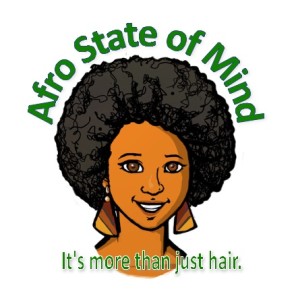
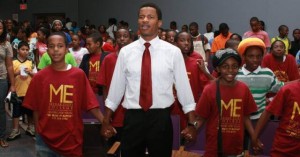
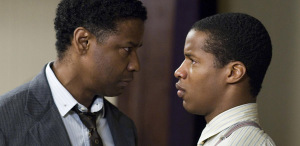
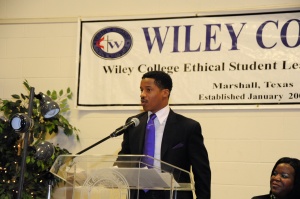
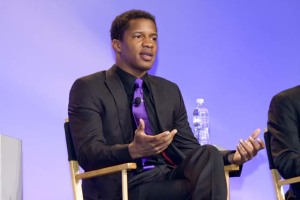
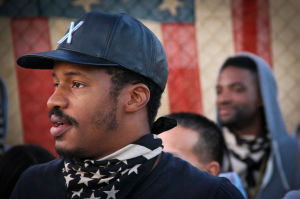
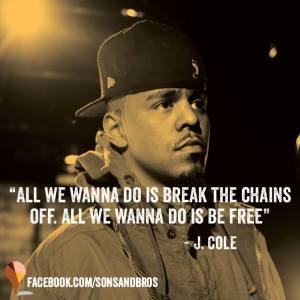
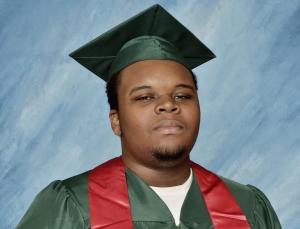


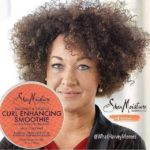
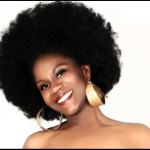
[…] Activist/Actor/Director Nate Parker is everywhere these days. He stars in the soon to be released film Beyond the Lights (opening in theaters tomorrow). He just released a powerful PSA inspired by the death of Mike Brown and the events in Ferguson, MO, and is currently working on his Nat Turner biopic, Birth of a Nation. Despite a very hectic schedule, the actor some are saying should be Hollywood’s next leading man, made time for an in-depth down interview with Afro State of Mind. (Click here for part two of our interview!) […]